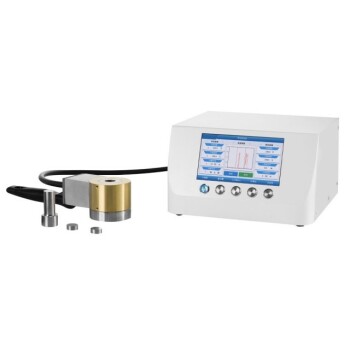At their core, the benefits of a hydraulic mini press are about efficiency and accessibility. The reduced physical effort minimizes operator fatigue and improves the consistency of sample preparation, while the small footprint makes high-quality analysis possible in space-constrained environments like crowded labs or mobile settings.
These features are not merely for convenience; they represent a strategic advantage. By optimizing for specific, common tasks like creating KBr pellets, mini presses enhance laboratory throughput, ensure repeatable results, and lower the barrier to entry for essential analytical techniques.

The Impact of Reduced Physical Effort
The primary operational advantage of a mini press is its user-centric design. This directly translates to higher quality work and a safer lab environment.
Minimizing Operator Fatigue and Error
Traditional or larger presses can be physically demanding. A mini press requires significantly less force to operate.
This reduction in effort allows a technician to prepare many samples consecutively without experiencing fatigue, which is a common source of inconsistency and error in sample preparation.
Ensuring Consistent Sample Preparation
Many hydraulic mini presses include an integrated pressure gauge. This feature, combined with the easy manual operation, allows the user to apply the exact same pressure every single time.
This repeatability is critical for techniques like FTIR spectroscopy, where the quality and thickness of the KBr pellet directly impact the quality of the spectral data. Consistent pressure leads to consistent, reliable results.
Improving Lab Ergonomics
The low-force operation makes the mini press a more ergonomic tool. It reduces the risk of repetitive strain injuries, making it a safer choice for routine, high-volume sample preparation workflows.
The Strategic Advantage of a Compact Footprint
For many laboratories, physical space is a finite and valuable resource. The compact design of a mini press is a key feature that provides significant flexibility.
Optimizing Valuable Laboratory Space
A mini press has a small footprint, often weighing only a few kilograms. This frees up critical counter space for other instruments and tasks.
In a crowded academic or industrial lab, this space efficiency is not a minor benefit—it can be the deciding factor in enabling a new analytical capability.
Enabling Portability and Flexibility
Their light weight and small size make mini presses inherently portable. They can be easily moved between workstations, shared among different lab groups, or stored away when not in use.
This portability also makes them ideal for mobile labs or fieldwork where sample preparation needs to be performed on-site.
Making Analysis Accessible
The combination of low cost, small size, and ease of use makes the mini press an ideal tool for educational settings, such as undergraduate chemistry labs.
It provides students with hands-on experience in a fundamental sample preparation technique without the cost or space requirements of a larger, industrial-grade press.
Understanding the Trade-offs
While highly efficient, a mini press is a specialized tool. Understanding its limitations is key to using it effectively.
Limited Force Application
The "mini" designation means a mini press delivers less total force than its larger counterparts. Most models generate around 2 tons of pressure.
This is more than sufficient for creating small KBr discs for FTIR but is inadequate for applications in materials science or geology that require significantly higher pressures.
Specialized, Not General-Purpose
Hydraulic mini presses are optimized for a very specific task: creating small-diameter pellets (e.g., 7mm). They are not designed to be a flexible, general-purpose press for a wide variety of sample sizes or types.
Making the Right Choice for Your Lab
Selecting the right press depends entirely on your specific analytical goals and laboratory constraints.
- If your primary focus is routine FTIR sample preparation: A hydraulic mini press is the most efficient, consistent, and ergonomic tool for the job.
- If your primary focus is maximizing limited lab space: The compact, portable design of a mini press is a strategic advantage that allows you to perform analysis where it was previously impractical.
- If your primary focus is high-pressure research or large samples: A larger, more powerful benchtop or floor-standing hydraulic press is the necessary choice.
Choosing the right tool is the first step toward optimizing your entire analytical workflow.
Summary Table:
| Benefit | Impact |
|---|---|
| Reduced Physical Effort | Minimizes operator fatigue, improves consistency, and enhances lab ergonomics for safer, high-volume workflows. |
| Compact Footprint | Saves valuable lab space, enables portability for mobile labs, and makes analysis accessible in crowded or educational environments. |
| Consistent Sample Prep | Ensures repeatable pressure application for reliable results in techniques like FTIR spectroscopy. |
| Strategic Advantages | Increases laboratory throughput, lowers barriers to entry, and optimizes workflows for specific tasks like KBr pellet creation. |
Ready to enhance your lab's efficiency with a hydraulic mini press? KINTEK specializes in lab press machines, including automatic lab presses, isostatic presses, and heated lab presses, designed to reduce physical effort, save space, and deliver consistent results for laboratories. Contact us today to discuss how our solutions can meet your specific needs and boost your analytical workflow! Contact us now
Visual Guide

Related Products
- Laboratory Hydraulic Press 2T Lab Pellet Press for KBR FTIR
- Automatic Laboratory Hydraulic Press Lab Pellet Press Machine
- Manual Laboratory Hydraulic Press Lab Pellet Press
- Laboratory Hydraulic Press Lab Pellet Press Button Battery Press
- Automatic Laboratory Hydraulic Press for XRF and KBR Pellet Pressing
People Also Ask
- How are hydraulic presses used in spectroscopy and compositional determination? Enhance Accuracy in FTIR and XRF Analysis
- Why is sample uniformity critical when using a laboratory hydraulic press for humic acid KBr pellets? Achieve FTIR Accuracy
- What role does a laboratory hydraulic press play in carbonate powder prep? Optimize Your Sample Analysis
- How is a laboratory hydraulic press used for polymer melt crystallization? Achieve Flawless Sample Standardization
- How is a laboratory hydraulic press used for Tb(III)-Organic Framework FT-IR samples? Expert Pellet Pressing Guide



















